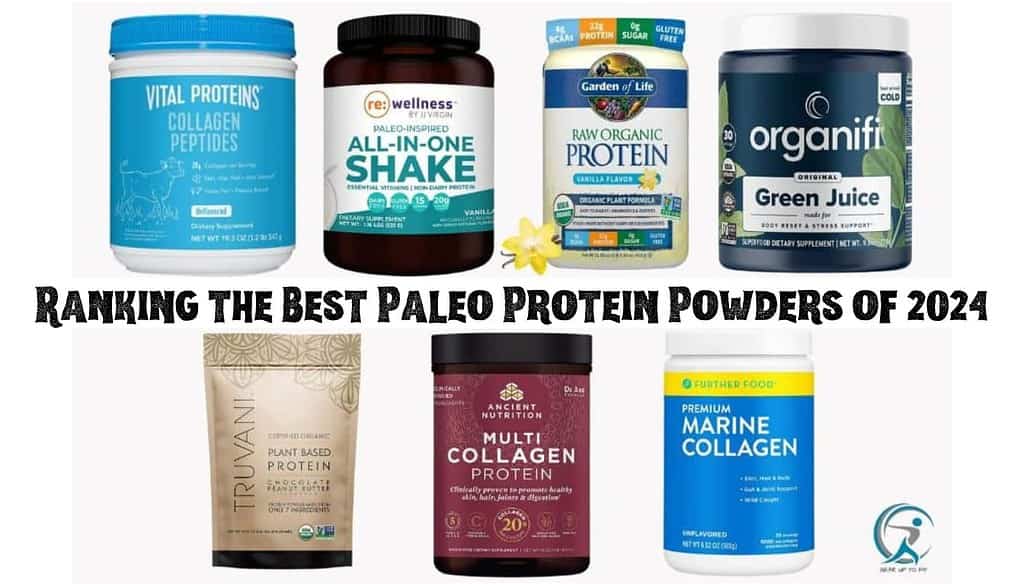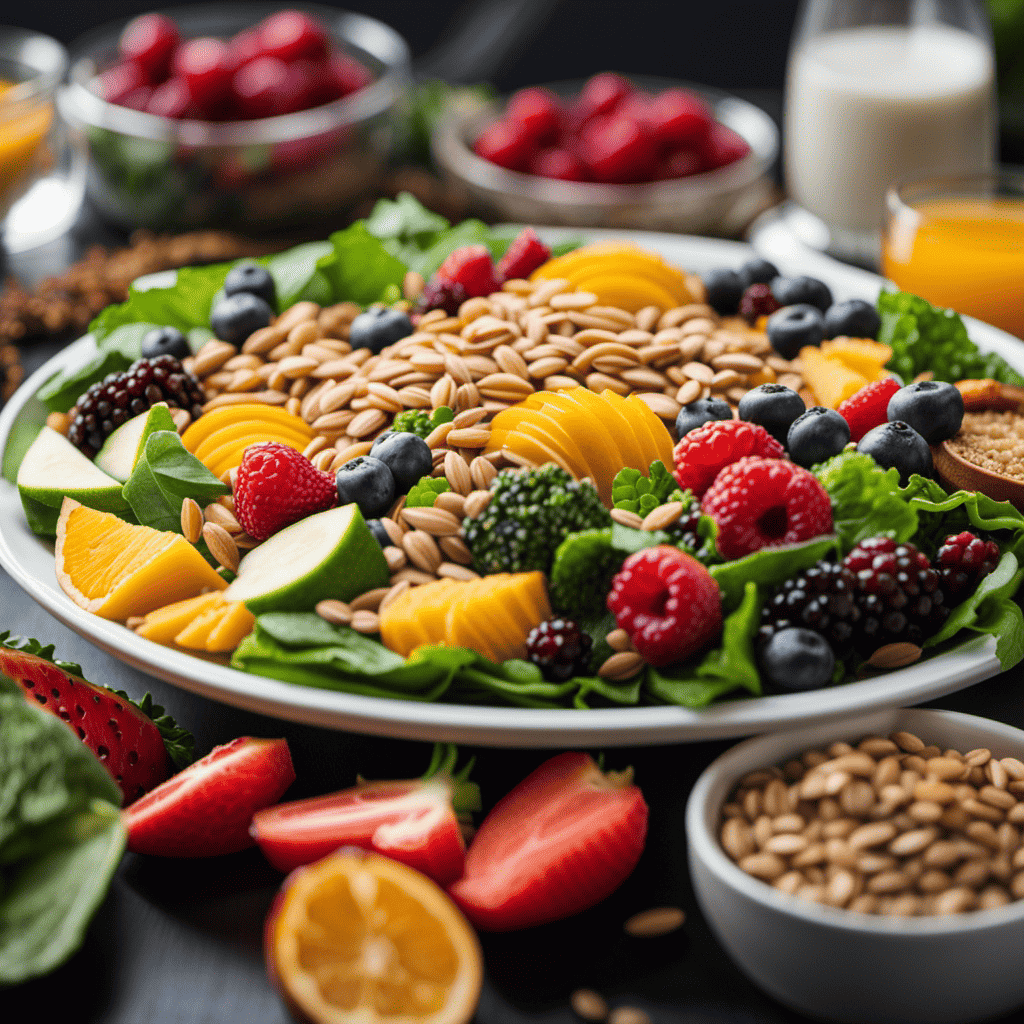Are you ready to take your running to the next level? Fueling Your Runs: A Comprehensive Guide to Pre and Post-Run Nutrition is here to help you optimize your performance and achieve your goals. Did you know that proper nutrition can enhance your endurance by up to 20%? This evidence-based guide will provide you with practical strategies for pre-run fueling, hydration, post-run muscle repair, and more. Get ready to unleash your full potential and run free!
Key Takeaways

- Proper nutrition and hydration before a run can enhance endurance by up to 20%.
- Aim to eat a balanced meal with carbohydrates, proteins, and healthy fats 2-3 hours before running.
- Hydrate with 16-20 ounces of water or electrolyte-rich fluids before a run to maintain optimal performance and prevent dehydration.
- Consider the glycemic index of carbohydrates for sustained energy, and choose complex carbs like whole grains, fruits, and vegetables over high GI foods that can cause energy crashes.
Understanding the Importance of Pre-Run Nutrition
You need to understand the importance of pre-run nutrition in order to fuel your body properly and optimize your performance. Pre run meal timing and hydration strategies play a crucial role in preparing your body for a run. When it comes to pre-run meals, timing is key. It’s important to eat a meal that provides you with sustained energy without causing discomfort during your run. Ideally, aim to eat a balanced meal containing carbohydrates, protein, and healthy fats about 2-3 hours before you start running. This will give your body enough time to digest the food and convert it into usable energy.
In addition to proper meal timing, pre run hydration is equally important. Hydrating adequately before a run helps maintain optimal performance and prevents dehydration. Aim to drink about 16-20 ounces of water or electrolyte-rich fluids around 2 hours before your run.
Essential Nutrients for Preparing Your Body for a Run

When it comes to preparing your body for a run, there are three key points you need to keep in mind: carbs for energy, hydration, and electrolytes. Carbohydrates are the primary source of fuel for your muscles during exercise, so consuming enough carbs before a run is crucial. Hydration plays a vital role in maintaining optimal performance and preventing dehydration during your runs. Lastly, electrolytes like sodium and potassium help regulate fluid balance and muscle function, so replenishing them is essential for peak performance. By focusing on these three aspects, you can ensure that your body is properly prepared to tackle any run with energy and endurance.
Carbs for Energy
Eating carbs before your run can provide you with the energy needed to power through your workout. Carbohydrates are the body’s preferred source of fuel during exercise, as they are easily broken down into glucose and stored in the muscles as glycogen. When it comes to carb loading, it’s important to consider the glycemic index (GI) of the carbohydrates you consume. Foods with a low GI release glucose slowly, providing sustained energy for longer workouts. On the other hand, foods with a high GI can quickly spike blood sugar levels, leading to an energy crash mid-run. To effectively fuel your runs with carbs, opt for complex carbohydrates like whole grains, fruits, and vegetables. These will provide a steady stream of energy throughout your run without causing sudden spikes or crashes in blood sugar levels.
Transition: Now that we have covered the importance of carbs for fueling your runs, let’s move on to another crucial aspect of pre-run nutrition: hydration and electrolytes.
Hydration and Electrolytes
Staying hydrated during your run is essential for maintaining optimal performance and preventing dehydration. Hydration strategies can vary depending on factors such as duration, intensity, and weather conditions of your run. It’s important to start hydrating before your run by drinking water or a sports drink containing electrolytes. During longer runs, consider carrying a water bottle or planning routes with access to drinking fountains. Electrolyte replenishment options include sports drinks, coconut water, or electrolyte tablets that can be added to water. Experiment with different options to find what works best for you.
Transition: Now that you know how to stay hydrated during your run, let’s shift our focus to timing your pre-run meal for optimal performance without feeling weighed down during your workout.
Timing Your Pre-Run Meal for Optimal Performance
Make sure to plan your pre-run meal at the right time to maximize your performance. The composition of your pre-run meal plays a crucial role in providing the necessary fuel for your body during exercise. Aim for a balanced meal that includes carbohydrates, proteins, and healthy fats. Carbohydrates are essential as they provide readily available energy for your muscles. Opt for complex carbohydrates like whole grains, fruits, and vegetables rather than simple sugars. Protein is important for muscle repair and recovery, so include sources like lean meats, fish, tofu, or legumes. Healthy fats from sources such as avocados or nuts can help sustain energy levels.
Timing is equally important when it comes to pre-run nutrition. Consuming a meal too close to your run can lead to discomfort and even digestive issues during exercise. It’s recommended to eat a light meal or snack 1-3 hours before running to allow adequate digestion time without feeling overly full or hungry.
Now that you understand the importance of timing your pre-run meal properly, let’s discuss hydration strategies for pre-run fueling.
Hydration Strategies for Pre-Run Fueling

When it comes to fueling your runs, timing your fluid intake is crucial for optimal performance. Proper hydration before, during, and after your run can help prevent dehydration and maintain electrolyte balance. It’s important to consider the duration and intensity of your run when planning your hydration strategy, as well as the options available for electrolyte replenishment such as sports drinks or electrolyte tablets.
Timing of Fluid Intake
Don’t forget to hydrate before and after your runs for optimal performance and recovery. Fluid intake during exercise is crucial to maintain proper hydration levels and prevent dehydration. During your workouts, it’s important to have a hydration strategy in place to ensure that you’re adequately replenishing the fluids lost through sweat. The timing of fluid intake is key in maximizing hydration benefits. It’s recommended to start hydrating at least two hours before your run, consuming around 16-20 ounces of fluids. During your run, aim to drink about 4-8 ounces of fluids every 15-20 minutes. After your run, continue hydrating by drinking water or electrolyte-rich beverages to replace any additional fluid losses. Transitioning into the subsequent section about electrolyte replenishment options, it’s also essential to consider replenishing electrolytes lost during exercise.
Electrolyte Replenishment Options
To maximize your hydration benefits, it’s important to consider electrolyte replenishment options after your run. When you exercise, especially for long durations or in hot weather, you may experience an electrolyte imbalance due to sweating. This can lead to symptoms such as muscle cramps, fatigue, dizziness, and even more severe complications if left unaddressed. To prevent this, there are several electrolyte replenishment options available. One popular choice is sports drinks that contain a mix of sodium, potassium, and other essential electrolytes. Other alternatives include electrolyte tablets or powders that can be added to water. It’s crucial to choose options that fit your personal preferences and needs. By replenishing the lost electrolytes post-run, you’ll ensure optimal recovery and performance for future workouts.
When it comes to fueling your long runs and optimizing endurance, carbohydrates play a vital role.
Fueling Your Long Runs: Carbohydrates and Endurance
Make sure you’re consuming enough carbohydrates to fuel your long runs and improve your endurance. Carbohydrate loading before a long run is essential for maximizing your performance. By increasing your carbohydrate intake in the days leading up to your run, you can effectively store glycogen in your muscles, providing a readily available source of energy during exercise.
To give you an idea of how much carbohydrate you should aim for, here’s a table outlining the recommended daily intake based on different activity levels:
| Activity Level | Carbohydrate Intake |
|---|---|
| Sedentary | 3-5 grams per kg |
| Moderate Exercise | 5-7 grams per kg |
| Endurance Training | 7-12 grams per kg |
During your long runs, fueling with additional carbohydrates is crucial to maintain energy levels and avoid hitting the dreaded “wall.” Aim for 30-60 grams of carbohydrates per hour of exercise, preferably from easily digestible sources such as gels, sports drinks, or bananas.
Transitioning into the role of protein in post-run recovery, it’s important to refuel with this macronutrient as well. Protein helps repair damaged muscle tissues and aids in muscle growth. So be sure to include some protein in your post-run meal or snack to support optimal recovery and prepare yourself for future training sessions.
The Role of Protein in Post-Run Recovery

Ensure you include protein in your post-run meal or snack to aid in muscle repair and growth, supporting optimal recovery for future training sessions. Protein synthesis is a key process that occurs in our muscles after exercise, helping to rebuild and strengthen the damaged muscle fibers. By consuming protein after your run, you can enhance this process and speed up muscle recovery.
Protein provides essential amino acids that are the building blocks of muscle tissue. When you exercise, especially during intense runs or strength training sessions, small tears occur in your muscles. Protein helps to repair these tears and promote muscle growth, allowing you to become stronger over time.
To maximize the benefits of protein for muscle recovery, aim to consume around 20-30 grams of high-quality protein within 30 minutes to an hour post-run. Good sources include lean meats like chicken or turkey, eggs, Greek yogurt, cottage cheese, nuts and seeds, and plant-based proteins such as tofu or legumes.
In addition to aiding muscle recovery through protein synthesis, replenishing electrolytes after a run is crucial for maintaining proper hydration levels and restoring electrolyte balance.
Replenishing Electrolytes After a Run
Replenishing electrolytes after a run is important for maintaining proper hydration levels and restoring electrolyte balance, which can help prevent muscle cramps and fatigue. Here are four ways you can replenish your electrolytes naturally:
- Electrolyte drinks: Opt for beverages that contain essential electrolytes like sodium, potassium, calcium, and magnesium. These drinks are specifically designed to rehydrate and replenish electrolytes lost through sweat.
- Coconut water: This natural beverage is not only refreshing but also rich in potassium, an important electrolyte that helps regulate muscle function and maintain fluid balance in the body.
- Bananas: Packed with potassium, bananas are a convenient snack option to replenish electrolytes post-run. They also provide carbohydrates for energy restoration.
- Leafy greens: Vegetables like spinach, kale, and Swiss chard are excellent sources of magnesium and calcium – two vital electrolytes involved in muscle contraction and relaxation.
Post-Run Snacks for Muscle Repair and Growth
Now that you’ve replenished your electrolytes after your run, it’s time to focus on muscle recovery and growth with post-run snacks. Nutrient timing plays a crucial role in optimizing these processes, so it’s important to choose the right foods at the right time.
After a workout, your muscles are in a state of breakdown and need proper nutrition to repair and rebuild. Consuming protein-rich snacks within 30 minutes of finishing your run can kickstart this process. Protein provides essential amino acids that promote muscle repair and growth.
Greek yogurt topped with berries or a small handful of nuts is an excellent choice for post-run snacking. The combination of protein from yogurt and antioxidants from berries helps to reduce inflammation and aids in muscle recovery. Additionally, nuts provide healthy fats that support joint health.
Another great option is a smoothie made with whey protein powder, spinach, banana, and almond milk. This refreshing snack packs a punch when it comes to nutrient content. Whey protein is quickly absorbed by the body, fueling muscle recovery effectively.
The Power of Antioxidants in Recovery Nutrition
When it comes to speeding up your recovery after a run, antioxidants can be a powerful tool in your nutrition arsenal. Not only do they help protect your body from free radicals and reduce inflammation, but they also have numerous benefits for overall health. Incorporating antioxidant-rich foods into your post-run snacks or meals can provide you with the necessary nutrients to support muscle repair and growth while boosting your immune system.
Benefits of Antioxidants
You’ll want to make sure you’re getting enough antioxidants in your diet to reap their numerous benefits. Antioxidants play a crucial role in reducing inflammation and supporting immune function, which are both essential for optimal recovery after intense physical activity. Here are four key benefits of incorporating antioxidants into your nutrition plan:
- Reduced Inflammation: Antioxidants combat the harmful effects of free radicals, which can cause inflammation in the body. By neutralizing these free radicals, antioxidants help reduce inflammation and promote faster recovery.
- Enhanced Immune Function: Antioxidants boost the immune system by protecting cells from damage caused by oxidative stress. This helps strengthen your body’s defense against illnesses and infections, allowing you to stay healthy and perform at your best.
- Improved Muscle Repair: Intense exercise can lead to muscle damage. Antioxidants aid in repairing damaged muscle tissue, promoting faster healing and minimizing post-exercise soreness.
- Increased Energy Levels: By combating oxidative stress, antioxidants support mitochondrial function—the energy powerhouse of our cells—resulting in increased energy levels during workouts and improved overall performance.
Speeding up Recovery
To speed up your recovery, it’s important to incorporate antioxidant-rich foods into your diet. Antioxidants are substances that help protect your cells from damage caused by free radicals, which are unstable molecules that can contribute to inflammation and slow down the healing process. By consuming foods high in antioxidants, you can support your body’s natural ability to repair and regenerate tissues after an injury or intense workout. In addition to speeding up recovery, antioxidants also play a crucial role in injury prevention by reducing oxidative stress and supporting immune function. Some of the best antioxidant-rich foods include berries, dark leafy greens, nuts and seeds, colorful fruits and vegetables, green tea, and dark chocolate. These foods not only provide a wide range of antioxidants but also offer other essential nutrients that promote overall health and well-being.
Best Antioxidant-Rich Foods
Incorporating antioxidant-rich foods into your diet can provide numerous health benefits. Not only do antioxidants help protect your body against oxidative stress and inflammation, but they also support immune function, enhance recovery, and promote overall well-being. Here are four antioxidant-rich foods that you can easily incorporate into your meals:
- Blueberries: Bursting with powerful antioxidants called anthocyanins, blueberries can help reduce muscle damage caused by intense exercise and improve post-workout recovery.
- Spinach: Packed with vitamins A and C, as well as other beneficial antioxidants like lutein and zeaxanthin, spinach supports eye health and strengthens the immune system.
- Dark chocolate: Indulging in a small square of dark chocolate provides a dose of flavonoids that have been shown to reduce inflammation and enhance blood flow.
- Green tea: Rich in catechins, green tea has anti-inflammatory properties that can aid in muscle repair after strenuous workouts.
Tailoring Your Nutrition Plan to Your Running Goals
When tailoring your nutrition plan to your running goals, it’s important to consider factors such as distance, intensity, and duration of your runs. If your goal is weight loss, focus on creating a calorie deficit by consuming fewer calories than you burn. This can be achieved by choosing nutrient-dense foods that are low in calories but high in vitamins, minerals, and fiber. Incorporate plenty of fruits, vegetables, whole grains, lean proteins, and healthy fats into your diet.
On the other hand, if you aim to gain muscle mass while running, prioritize protein consumption to support muscle repair and growth. Aim for a daily intake of around 1.2-1.7 grams of protein per kilogram of body weight. Include sources like lean meats, poultry, fish, dairy products or alternatives (such as tofu or legumes), eggs, and nuts.
Regardless of your specific goal – whether it’s weight loss or muscle gain – remember to fuel yourself properly before and after workouts. Prioritize carbohydrates before exercise for energy and glycogen replenishment afterward for recovery.
It’s crucial to listen to your body and make adjustments based on how you feel during training. Experiment with different approaches until you find what works best for you. Remember that freedom lies in finding the balance that aligns with both your nutritional needs and running goals!
Frequently Asked Questions
What Are the Best Foods to Eat Before a Run to Avoid Digestive Issues?
To avoid digestive issues before a run, it’s best to stay away from foods high in fiber, fat, and protein. Instead, opt for easily digestible carbs like bananas or toast with a little peanut butter.
Can I Drink Coffee Before a Run for an Energy Boost?
Yes, you can drink coffee before a run for an energy boost. However, there are alternatives like green tea or beet juice that provide similar benefits without the potential negative effects of caffeine.
How Long Should I Wait After Eating Before Going for a Run?
You gotta time it right, buddy. Waiting 1-2 hours after eating ensures your body can digest properly and reduces the risk of cramps. Eating before a run can affect performance, so find what works for you!
Is It Necessary to Consume Sports Drinks During Shorter Runs?
You don’t have to consume sports drinks during shorter runs, but they can provide benefits like hydration and energy. If you prefer alternatives, consider water with electrolytes or homemade natural beverages for a healthier option.
Are There Any Specific Foods That Can Help With Muscle Soreness and Recovery After a Run?
After your run, you may wonder what foods can help with muscle soreness and recovery. Some great post-run snacks include bananas for potassium, Greek yogurt for protein, and tart cherry juice for its anti-inflammatory properties.
Conclusion
In conclusion, fueling your runs with proper nutrition is essential for optimal performance and recovery. By understanding the importance of pre-run nutrition and consuming the right combination of nutrients, you can prepare your body for a successful run. Timing your meals strategically and staying hydrated are key factors in maximizing your performance. Additionally, replenishing electrolytes and consuming post-run snacks rich in protein can aid in muscle repair and growth. According to a study published in the Journal of Applied Physiology, athletes who consumed carbohydrates before their long runs experienced a 2-3% increase in endurance compared to those who did not. So remember, nourishing your body properly before and after your runs can make a significant difference in your overall running goals.
As a veteran fitness technology innovator and the founder of GearUpToFit.com, Alex Papaioannou stands at the intersection of health science and artificial intelligence. With over a decade of specialized experience in digital wellness solutions, he’s transforming how people approach their fitness journey through data-driven methodologies.
